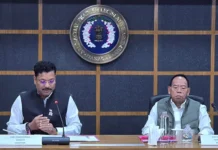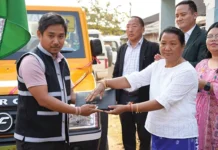RONO HILLS, May 18: The Rajiv Gandhi University (RGU) began its five-day online faculty development program (FDP) on the theme ‘Re-thinking research and contemporary development priorities: Learning essentials for a sustainable future,’ organized by the university’s department of social work on Monday.
The programme commenced online from 18 May through Cisco Webex platform. The participants include academicians, research scholars, development professionals and social scientists representing more than 20 states and 50 different institutions across India.
The inaugural session witnessed participation of 100 delegates and resource persons, including RGU Vice Chancellor Prof Saket Kushwaha, Pro-VC Prof Amitava Mitra, TISS, Guwahati Deputy Director Prof Kalpana Sarathy, HoD i/c and Convenor-FDP Dr Kaushalendra Pratap Singh.
Addressing the inaugural session, RGU Vice Chancellor Prof Saket Kushwaha said, “When the world is suffering from the global pandemic and people are bound to stay at home restricting all kinds of movements in every walk of life, this worldwide crisis has given us the opportunity to evolve and search new strategies.”
The vice chancellor also highlighted the need to revisit and redefine individual and institutional priorities from sustainability approach. He threw light on how the technological advancement has changed the face of the learning. Importance of emerging practices viz. gross happiness index over GDP as an indicator of growth was also emphasized on by Prof Kushwaha.
RGU Pro Vice-Chancellor Prof Amitava Mitra highlighted the significance of a trans-disciplinary practice-based discourse for a sustainable future, while Assistant Professor and FDP convenor Dr Ravi Ranjan Kumar served as master of the e-ceremony.
The first technical session was delivered by TISS, Guwahati, Assam Deputy Director Prof Kalpana Sarathy, who shared practical and theoretical insights on ‘Mental health: vulnerability, resilience, and overall well-being’.
She focused on the importance of mental wellbeing as an ignored area in the country and how people can tackle the psychological needs of women, children, youth, the specially abled and other vulnerable population pertaining to the current needs of the individuals during the unprecedented Covid-19 pandemic.
The second technical session of the day was delivered by Dr Rajendra Singh who is known as Waterman of India and winner of Stockholm Water Prize and Ramon Magsaysay Awardee and Chairman of Tarun Bharat Sangh (TBS).
Dr Singh shared insights regarding ‘Environmental sustainability: Inter and intra generational justice, trans-boundary pollution and population’.
He focused on going back to basic social fabric, such as villages, for preserving the environment.
The Waterman of India also suggested initiating courses like ‘nourishing nature’ instead of ‘fashionably’ taught environmental studies which offer only synthetic learning and lacks in grass root reality based attitudinal transformation of learners.


